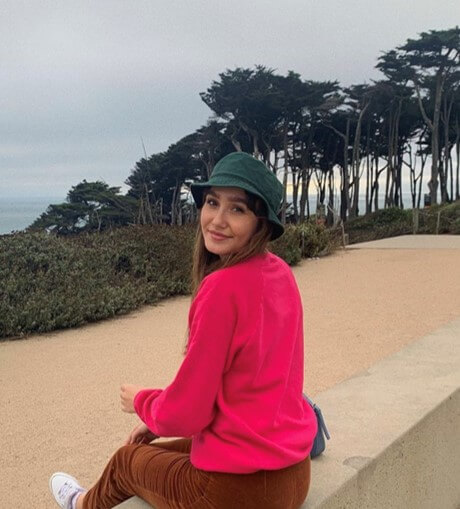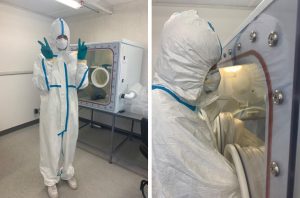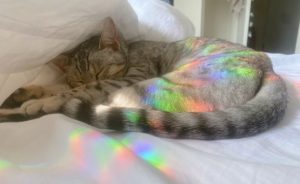
Hi – I’m Frances Butterfield and I’m originally from Treaty One territory, or Winnipeg. I’m a fourth year student in the Combined Major in Science (CMS) program and biology is one of my packages, along with chemistry and earth and ocean sciences. I really like the CMS program because it gives me flexibility in terms of what courses I can take.
I am a Presidential Scholar and received the TUUM EST Experiential Award in my first-year. I have also received the INDSPIRE award and the Indigenous Student Award through the Irving K. Barber BC Scholarship Society. In my first year I was part of the Scholars Community, where I worked as a volunteer to help organize events. I have also spent a lot of time at the Longhouse where I was a Collegia Advisor for two years, and I’ve served as a fund adjudicator for the Indigenous Strategic Initiatives Fund.

Recently, I had the opportunity to perform COVID diagnostics in more isolated communities in the Northwest Territories during the summers of 2020 and 2021. I worked in a lab and helped process COVID tests for these communities which was a rewarding experience as I was doing something that was very relevant and that was impacting a lot of people in an important way.
What led you to UBC?
I knew that I wanted to go away for university because when I was eight, I lived in France for a year with my family and that experience showed me that I tend to really thrive and grow when immersed in new environments. So I saw university as an opportunity to push my boundaries and have an experience somewhere outside of what was so familiar to me. I also knew I wanted to go into dentistry and I heard that UBC has a great Science program and one of the best dental schools in the country. Finally, I heard that Vancouver is really beautiful, which drew me to UBC because Winnipeg is really cold and so I was happy to be able to go somewhere with warmer winters and that is close to the ocean.
What do you most enjoy about being a UBC Science student?
I love science and I’m also Métis, and being at UBC has opened some great opportunities for me to be able to combine those two worlds. For example, I’ve been able to collaborate with folks in science to create resources that focus on making science more accessible for Indigenous students.
I also really enjoy being a part of the community at the Longhouse. It is one of the only places on campus where I feel completely comfortable as everyone has a sort of unspoken understanding of one another. I’ve met a lot of people who I share similar experiences with and who have a similar family history to me, which has been really reassuring and has given me a sense of belonging.
How has your unique background influenced your experience as a student?
Through my experience trying to access health care resources, I have realized the need for more people to go into health care positions who have the personal experience to be able to relate with those they are treating and to provide them with the appropriate care that they need. I had a lot of difficulty trying to get registered with the Center for Accessibility (CFA) in my first year and have been dismissed by a number of health care workers. When health care professionals are dismissive, it discourages people from seeking out help or care and this is only one example of the many barriers that exist within the health care system. Indigenous people are especially effected by these barriers, and through my conversations with students and staff at the Longhouse, I’ve heard several stories of people who have had difficulty with accessing and engaging with the health care system. These experiences have made me more determined to pursue a pathway where I can hopefully make health care more accessible to Indigenous people.
What is something you have done at UBC that you are excited about?
Last year I was hired under a grant with the Indigenous Initiatives and UBC Science and through this opportunity, I created a resource for non-Indigenous STEM faculty on how to create safer spaces for Indigenous students. I worked with Ashley Welsh, a Science Faculty Liaison, to create this FAQ-styled document in which we share relevant resources, advice, and information to guide folks in their learning. We started off thinking the document would be around 4 pages, but as we continued working on it, we realized it would be something much greater, and it expanded to become 17 pages long. The document, How do I get started? Creating safer learning environments for Indigenous students in STEM at UBC, is organized into five main sections that address some commonly asked questions that non-Indigenous STEM faculty often have in regards to how to create safer spaces for Indigenous students, specifically within the STEM context.
Based on conversations I’ve had with other Indigenous students and my own personal experience as an Indigenous student in science, I really wanted to convey to instructors that when thinking about how to create safe classroom environments for Indigenous students, they should focus on working to incorporate Indigenous Ways of Knowing and Being into both their curriculum and teaching practices. Western science as a way of knowing has many limitations as it is rooted in colonial ways of thinking and practices. If we were to incorporate principles of Indigenous Ways of Knowing into science – such as giving nature agency, incorporating spiritual elements, and using storytelling – not only would it make science more accessible, but it would benefit the scientific community as a whole. Creating a space where other Ways of Knowing and perspectives are recognized, embraced, and valued would create an opportunity to expand science as we know it.
What was it like for you to create this document?
This project ended up being very personal in a lot of ways. I’m very passionate about the topics and issues that are discussed in the resource and I see a real need for these things to be addressed. I also learned a lot about myself and was able to really refine my own knowledge, understanding, and perspectives as I thought, wrote, and engaged in conversations about the document’s content. A lot of the answers are based on my own experiences and things I’ve observed in my classes, as well as conversations with other Indigenous students and folks we consulted with. It was important to me to have other Indigenous students look it over and give their feedback because I wanted it to represent more than just my experience and speak to the experiences of others.
I also had to learn how to communicate these thoughts and ideas in a way that would be digestible and help the intended audience to see what we want them to see. We needed to say things in a way that they would be able to receive and in a way that would help them reframe their thinking or shift their perspective. I really had to reflect and think about, okay, how do I translate and communicate this to folks who are new these conversations?
After creating this document, what key advice would you give instructors for making the classroom a safer space and more supportive for Indigenous students?
A huge aspect of working to create supportive spaces for Indigenous students is simply being open to embracing vulnerability and being willing to bring emotion into the space. I think the message instructors so often get is that they have to be perfect, but it’s more important that they bring themselves – their whole selves – into the classroom space, and that they also let their students bring their whole selves to the space. It is beneficial for Indigenous students, and for all students, to have a space where there’s a bit more vulnerability and where people are comfortable with being real and being human.
What is something you are currently doing that you are excited about?
I’ve personally found and have heard from other Indigenous students, that it is often difficult to locate available resources and supports. For example, when I was trying to get registered with the CFA in my first year, I had such a hard time with it and then I found out in my second year that there are specific CFA advisors that can help Indigenous students get registered, which would have been so useful for me to know when I was going through the process. I’m currently working with Ashley Welsh to create a document for Indigenous students in science that contains all of the available resources and pertinent information in one place. There are lots of great things in place to support Indigenous students that they should know about, but it is difficult to navigate locating and accessing them, and I’m hoping that this document will help. It’s a huge job, though. The campus is so big and there are so many people working on different things in different areas. I’m in my fourth year and there’s still so many things that I’m finding I wasn’t aware of and didn’t even know how to look up.
What advice would you give to other UBC Science students?
I didn’t start to attend office hours or ask questions on Piazza until way later in my university journey, but it’s been something that I’ve found to be super helpful. Reaching out for help has also resulted in interesting experiences and opportunities. For example, the way I got involved with creating the document mentioned above was because I happened to go and talk with my BIOL 112 professor at the time, Karen Smith, and based on our conversation she connected me with Ashley Welsh. So, I encourage students to not be afraid to reach out and ask for help because people really want to help you and you never know what kinds of opportunities may arise from just having a conversation.
Also, school can be really hard and things might not always go as you planned. If you don’t do well on an exam or don’t pass a class, or if you have to drop a class or defer an exam or have to get a concession, that’s okay. These things don’t define who you are, what you are capable of, or how ‘successful’ you are. Life happens, and facing adversity is inevitable for all of us, but it doesn’t mean that you’re not as capable as everyone else, it just means that your circumstances are preventing you from being able to have the outcome that you were hoping for. So, try not to be too hard on yourself, be forgiving of yourself, and ask for help when you need it. I think that with having ADHD, I am often hard on myself when I’m not able to get things done as fast as other people, but getting accommodations has been so helpful for me. Accessing resources that are available to me doesn’t mean that I’m not smart or capable, it’s what these supports are in place for and it’s just what I personally need to be able to perform to the best of my ability.
What do you like to do in your spare time?

I really like puzzling, but I have to limit myself otherwise it can take over my life. I also spend a lot of my time with my cat, Tia, and I really enjoy just spending time with a friend or being in their company. Regardless of what we do together, I always feel refreshed after spending quality time with a friend.
I really enjoy gardening and I hope to spend more time gardening this summer, as being close to the Earth and spending time outside makes me feel grounded. I plan to grow tomatoes, green beans, peas, onions, basil, and maybe some lavender.
I have also recently started going to pottery classes outside of UBC, which has been a great opportunity for me to take a break from studying and indulge in something that brings out my creativity.
What are your plans following graduation?
I would like to go into dentistry and work within more isolated Indigenous communities or on reserves. My grandma had lost all her teeth before she was 18 and my dad didn’t go to the dentist until much later in his life when he could pay for it himself, so I realize the impact that having limited access to dental care has on people. There is a lot of mistrust towards healthcare workers who come into Indigenous communities and generally speaking, there’s are a lot of issues surrounding access to dental care, which is why I hope to work within these communities.
But before going to dental school, I would like to take a bit of a break to travel. I’d like to go to Costa Rica and maybe see some new places in Europe and Asia. It’d be nice to experience different parts of the world and have a change of pace before I throw myself back into four years of school.